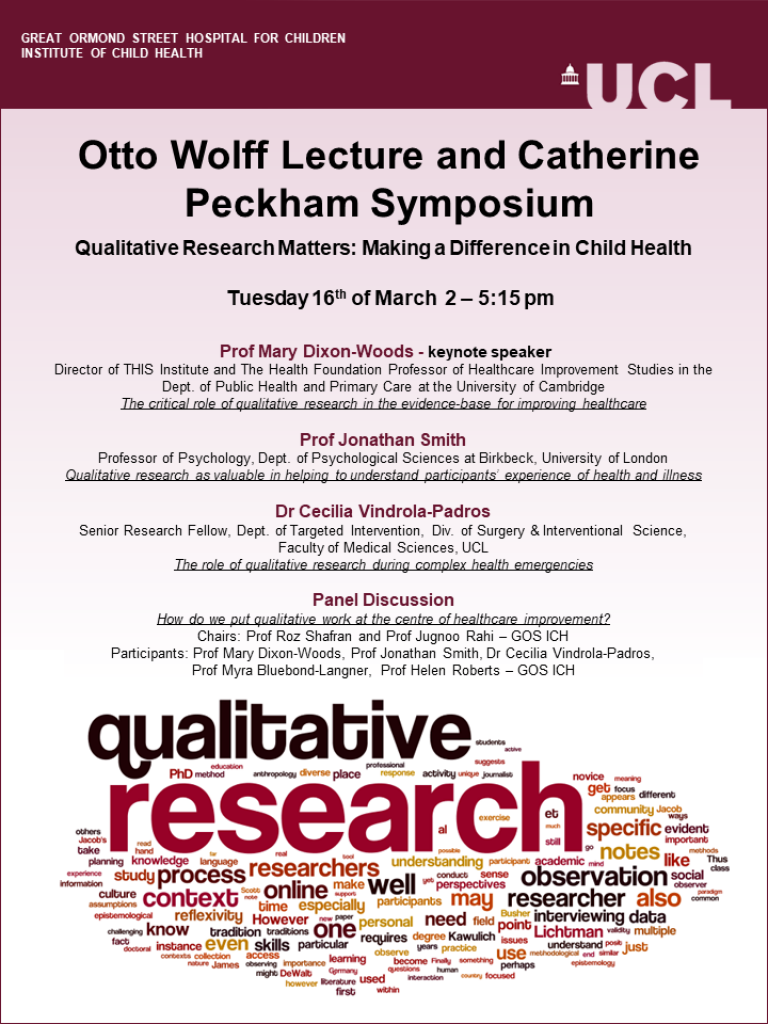PPP Otto Wolff Lecture and Catherine Peckham Symposium 2021
16 March 2021, 2:00 pm–5:15 pm

Understanding, indeed improving children’s health and well-being requires a multidisciplinary approach to research, practice and policy. Our work needs to be informed by the best evidence. This year’s Otto Wolff Lecture and Catherine Peckham Symposium focuses on the place of qualitative research in the work of three leaders and their teams as they endeavour to ensure the highest standards of care for our most precious resource- children and young people. With a qualitative gaze their talks as well as discussions with panellists and the audience will range from the theoretical to the practical in areas of quality and safety in health care, patient and family experience and rapid response to epidemics and pandemics.
Event Information
Open to
- All
Availability
- Yes
Organiser
-
PPP Communications
Location
-
Online30 Guilford StreetLondonWC1N 1EH
Otto Wolff Lecture
14:00-14:10 Introduction by Prof Ros Smyth, Director of ICH
14:10-15:00 Prof Mary Dixon-Woods.
Director of THIS Institute (The Healthcare Improvement Studies Institute) and The Health Foundation Professor of Healthcare Improvement Studies in the Department of Public Health and Primary Care at the University of Cambridge
The critical role of qualitative research in the evidence-base for improving healthcare
This talk will identify the crucial role of qualitative research in identifying, understanding, and characterising problems in quality and safety and health care, and in evaluating efforts to address those problems. Using a range of examples, Professor Dixon-Woods will illustrate the power of carefully-designed mixed-method and multi-method research approaches in cumulating knowledge, advancing theory, and improving care.
Mary Dixon-Woods is Director of the THIS Institute and is The Health Foundation Professor of Healthcare Improvement Studies in the Department of Public Health and Primary Care at the University of Cambridge. Leading a programme of research focused on healthcare improvement, healthcare ethics, and methodological innovation in studying healthcare Professor Dixon-Woods high quality evidence-base to support the organisation, quality and safety of care delivered to patients.
15:00 - 15.15 BREAK
Catherine Peckham Symposium
15.15 - 15.25 Introduction by Chair Myra Bluebond-Langner, PhD, Hon. FRCPCH
Professor and True Colours Chair in Palliative Care for Children and Young People, UCL- Louis Dundas Centre for Children’s Palliative Care
15.25 – 15.55 Prof Jonathan Smith
Professor of Psychology, Dept. of Psychological Sciences at Birkbeck, University of London
Qualitative research as valuable in helping to understand participants’ experience of health and illness
In this talk Professor Jonathan Smith will show how one particular qualitative methodology, Interpretative Phenomenological Analysis (IPA), can be used to address issues of importance to participants as they confront challenges to or concerns about their health. He will illustrate the talk with examples from his own empirical work.
Jonathan Smith is Professor of Psychology at Birkbeck University of London where he leads the Interpretative Phenomenological Analysis (IPA) Research Group. He developed IPA as a detailed experiential qualitative methodology and has employed it to address a wide range of issues particularly around health and illness.
15.55 – 16.25 Dr Cecilia Vindrola-Padros
Senior Research Fellow, Dept. of Targeted Intervention, Div. of Surgery & Interventional Science, Faculty of Medical Sciences, UCL
The role of qualitative research during complex health emergencies
This presentation highlights the contributions that qualitative research can make to epidemic response efforts. It will identify factors that qualitative researchers need to take into consideration when designing and implementing research in these cricumstances in order for it to be rapid, relevant and responsive. The presenter will draw from her team's experience in the field of rapid qualitative research and provide recent examples of the application of these approaches during the COVID-19 pandemic.
Cecilia Vindrola-Padros is Senior Research Fellow and Co-Director of the Rapid Research Evaluation and Appraisal Lab (RREAL) at UCL. Drawing on her extensive experience in ethnograpghy Dr Vendrola-Padros has developed a number of qualitative research techniques to improve the quality and impact of rapid research for studying and evaluating clinical and health service models and interventions in time sensitive contexts
16:25 – 16.40 BREAK
16.40 – 17.10 Panel Discussion: How do we put qualitative work at the centre of healthcare improvement?
Chairs Professor Roz Shafran and Professor Jugnoo Rahi.
Professor Roz Shafran is Professor of Translational Psychology at Great Ormond Street Institute of Child Health where she leads the Psychological Medicine Research Team. Her work on psychological treatment development and evaluation typically begins with qualitative research to enhance understanding of the experience and treatment of a range of mental health problems.
Jugnoo Rahi is professor of Opthalmology and Epidemiology at Great Ormond Street Institute of Child Health where she leads the Vision and Eyes Group, a unique multi-disciplinary population health sciences research group. Their interests are in visual health, eye disease and visual impairment in childhood and in the early life origins of and life course influences on chronic complex eye conditions and visual health in adult life. Through their research we aim to enhance understanding to improve prevention, diagnosis and treatment, and to inform service and policy decisions nationally and internationally.
Participants: Helen Roberts, Cecilia Vindrola-Padros, Jonathan Smith, Mary Dixon-Woods, Myra Bluebond-Langner.
Helen Roberts is Professor of Child Health Research at UCL Great Ormond Street Institute of Child Health. She a medical sociologist and was educated/trained at the Universities of Reading, Aix-Marseille and Sussex and the Social Statistics Research Unit act City University. She spent a decade in the third sector leading R&D with the children’s charity Barnardo’s; had a secondment to a government department to work on a green paper on the family and spent almost 10 years on the board of NICE. She has a long history of researching and publishing qualitative and mixed methods research, engaging in co-production and evidence synthesis and looking for opportunities for evidence-informed advocacy to narrow inequalities in child and maternal health.
Myra Bluebond-Langner is Professor and True Colours Chair in Palliative Care for Children and Young People at Great Ormond Street Institute of Child Health. Academic lead for Louis Dundas Centre for Children’s Palliative which aims to reduce suffering for children with life limiting conditions and life threatening illnesses and their families. Knowing that suffering can be both derived from and exacerbated by any number of factors in any number of areas our investigations are spread over four domains: patient and family experience, communication and decision, pain and symptom management and health service development and delivery.
17.10-17.15 Closing remarks
Other events in this series
 Close
Close



